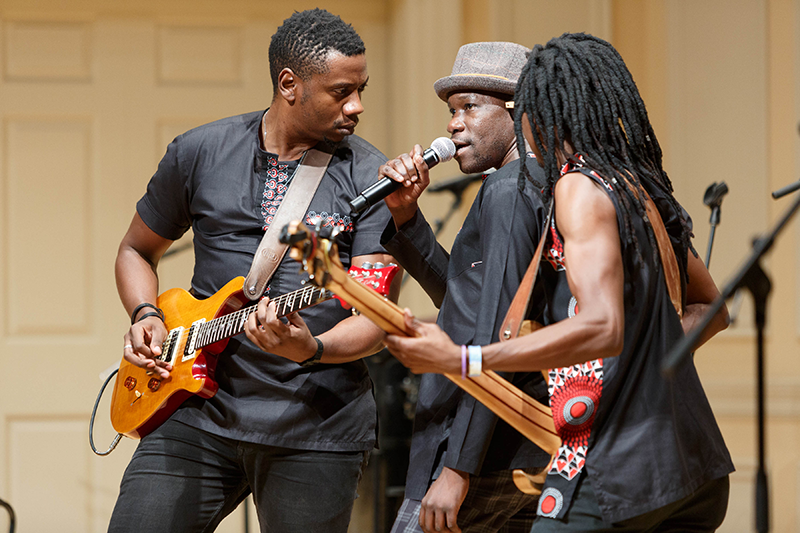- Entertainment
- No Comment
US: Zimbabwe’s Mokoomba brings dynamic Afro-fusion performance to Williams College

By Isabella Hayden I Williams College
Massachusetts: A large crowd gathered in Chapin Hall on Friday, April 5 for a concert by the celebrated Zimbabwean Afro-fusion band Mokoomba. Hosted by the music department as part of its Ernest Brown World Music Series, which brings musicians from across the globe to the College, Mokoomba’s charismatic six-man lineup played a varied set ranging from heartfelt ballads to rousing and irresistible dance numbers.
The name Mokoomba is a Tonga word that “means the deep respect that we have for the river, as a source of life,” lead guitarist Trustworth “Trust” Samende said in an interview with the Record. The river Samende referred to is the Zambezi — the fourth longest in Africa — which is famed for its Victoria Falls.
Located on the border between Zimbabwe and Zambia, Victoria Falls is considered the largest waterfall in the world. It is also the location of the band members’ hometown where they grew up together.
“Our parents would not buy us instruments because they did not believe we would make it [in the industry],” Samende said of their start in Victoria Falls. “There was this old man, living in the neighborhood, who had instruments. We would all go there after school and practice.”
The Zambezi River may also be familiar to students at the College as the namesake of the Zambezi Marimba band, currently led by Tendai Muparutsa, Artist in Residence in African Music Performance. Muparutsa, who is also from Zimbabwe, gave an introductory address before the show.
The band opened with a flowing instrumental number, with Samende playing cascading runs on the guitar that were interrupted only by sparse bursts of sound from Miti Mugande on percussion and Ndaba Coster Moyo on drums.
Tinotenda Zingapeta, on bass, and Phathisani Moyo, on keyboard, skillfully provided a chordal foundation upon which the band’s subtle layers of sound could comfortably rise and fall.
This seamless and immersive sonic ebb and flow seemed impressive enough, until frontman Mathias Muzaza strode on stage, arms wide, in a bright yellow patterned cardigan that announced the next step in the audience’s musical journey.

During the performance, Muzaza displayed his enviable combination of extreme talent and consummate stage presence, capable of commanding the hall with only his voice while seated.
Displaying his immense vocal range, Muzaza provided an element of extraordinary contrast above the band’s ocean of sound through his combination of a childish yet full-bodied falsetto with a deep, resonant chest voice that trailed off into controlled tonal laughter at the ends of phrases. When the band joined him in an impressively sudden dynamic jump, the entire audience visibly sat back, riveted by the unexpected volume.
In an interlude before the second number, Muzaza explained that the next song was about his late parents. “Matthias [Muzaza]’s father died while we were on our first tour, in 2009, in Europe,” Samende said in an interview with the Record.
“Then we went back home, and [his] mother died a week after our arrival. So, in that song, he talks about how he never got a chance to say goodbye, as he was in a position where he’s happy that his gift, his talent, is taking him places.”
The moving and broken melodies of the song captured the sorrowful circumstances, but the group soon after launched into a number that energized the audience.
For the rest of the concert, Chapin Hall transformed into an impromptu dance floor. Following the lead of not only Muzaza, but also Samende and Zingapeta — who both rocked out on their instruments while dancing — audience members began to congregate in dance circles. A group that included College professors and students began bopping in a large circle in the back by the doors.
Toddlers began dancing in front of the stage. Canadian students from Quebec — who had driven four hours to come to the concert — migrated from the balconies to the aisles, whirling about with abandon. Even the Campus Safety Services officer in the back of the hall swayed to the music.
The band pulled out all of the stops for the remainder of its nearly 90-minute performance. During one song, all six of the band members left their instruments and sang, demonstrating that they could be a world-class a cappella group if they so wished.
For another piece, the band brought up Alexia King ’26 to join them in dancing, while Xan McKenna ’24 and Mali Rauch ’26 provided backup vocals.
The students had participated in a workshop with Mokoomba earlier in the day for members of Kusika and Zambezi Marimba Band. Muzaza eventually had to lose that eye-catching yellow cardigan due to heat, but lost none of his command over the audience.
“We play a lot of big festivals, but for me, personally, or even the band, we enjoy these types of shows, because it’s up close with the audience,” Samende said.
“You feel more connected with these people. They don’t understand the language, they don’t know our music, they don’t know our band. But the reception is amazing.”
